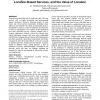151 search results - page 22 / 31 » Minimality Attack in Privacy Preserving Data Publishing |
KDD
2009
ACM
14 years 8 months ago
2009
ACM
The availability and the accuracy of the data dictate the success of a data mining application. Increasingly, there is a need to resort to on-line data collection to address the p...
HUC
2010
Springer
13 years 8 months ago
2010
Springer
Long-term personal GPS data is useful for many UbiComp services such as traffic monitoring and environmental impact assessment. However, inference attacks on such traces can revea...
WWW
2009
ACM
14 years 8 months ago
2009
ACM
On-line social networks, such as Facebook, are increasingly utilized by many users. These networks allow people to publish details about themselves and connect to their friends. S...
ICDE
2008
IEEE
14 years 9 months ago
2008
IEEE
When disseminating data involving human subjects, researchers have to weigh in the requirements of privacy of the individuals involved in the data. A model widely used for enhancin...
STOC
2009
ACM
14 years 8 months ago
2009
ACM
A mechanism for releasing information about a statistical database with sensitive data must resolve a trade-off between utility and privacy. Publishing fully accurate information ...

